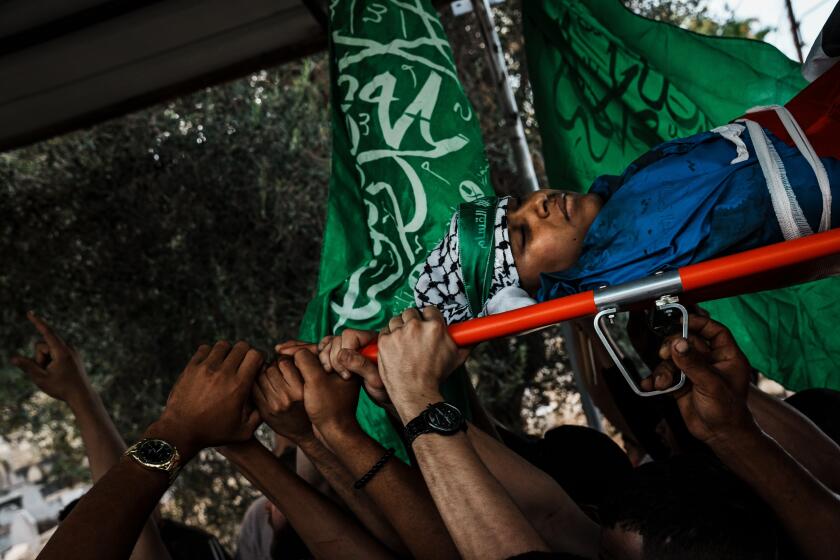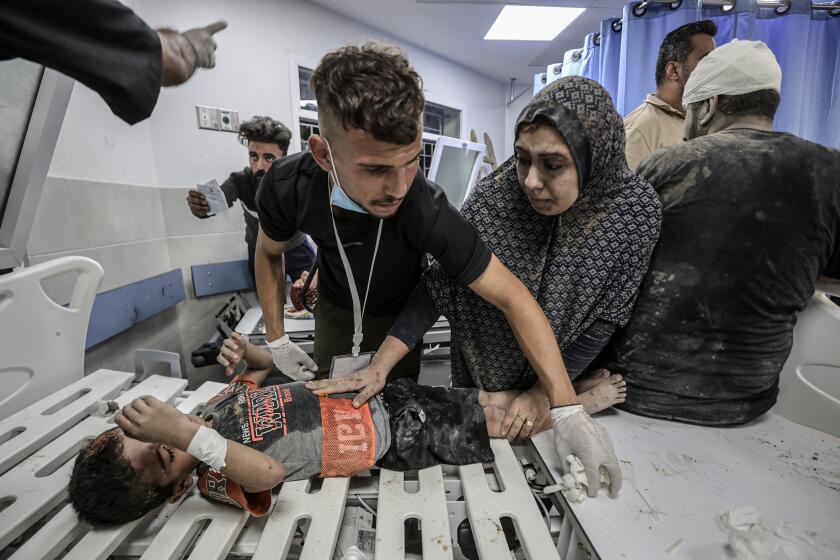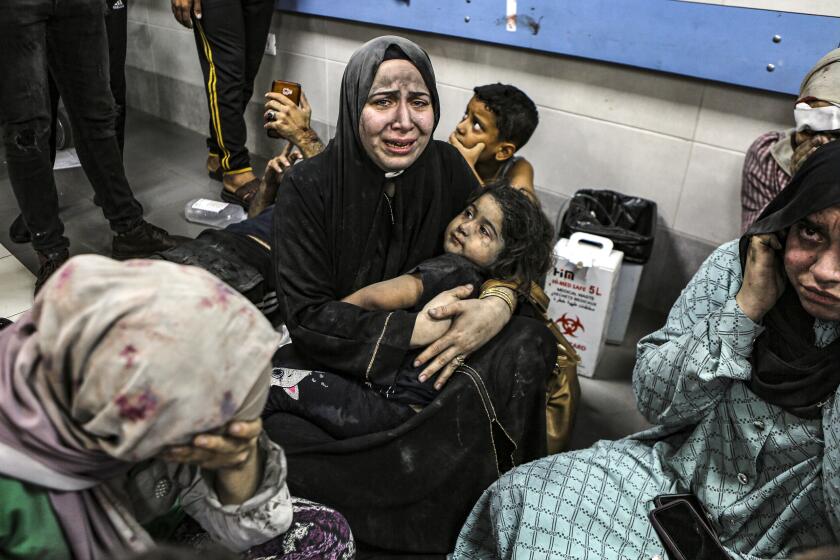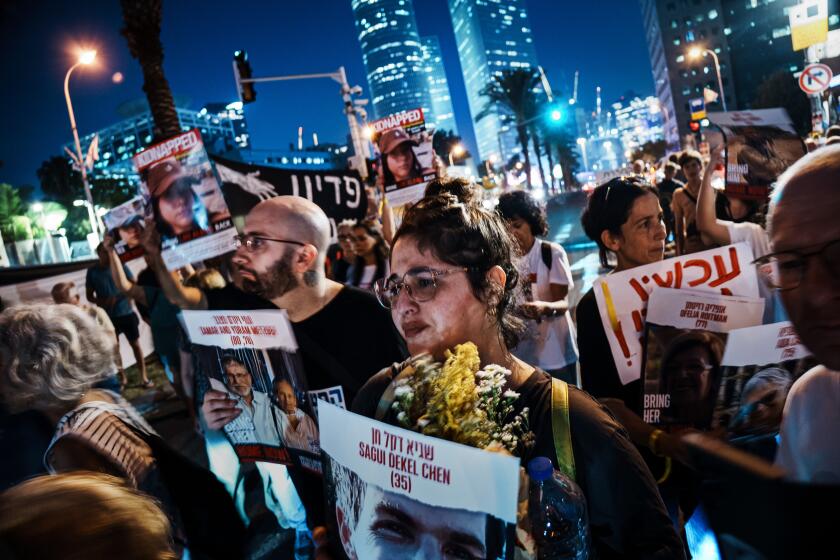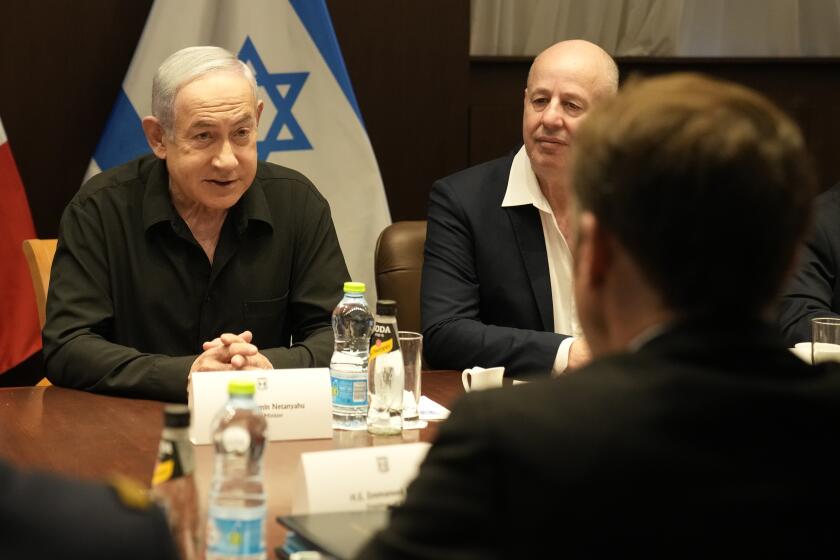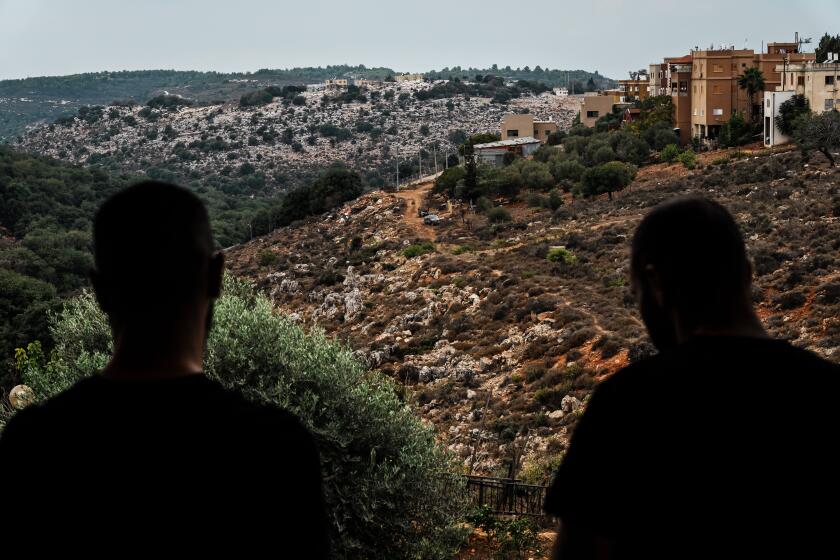Israel’s Netanyahu says the Gaza war has entered a new stage, will be ‘long and difficult’
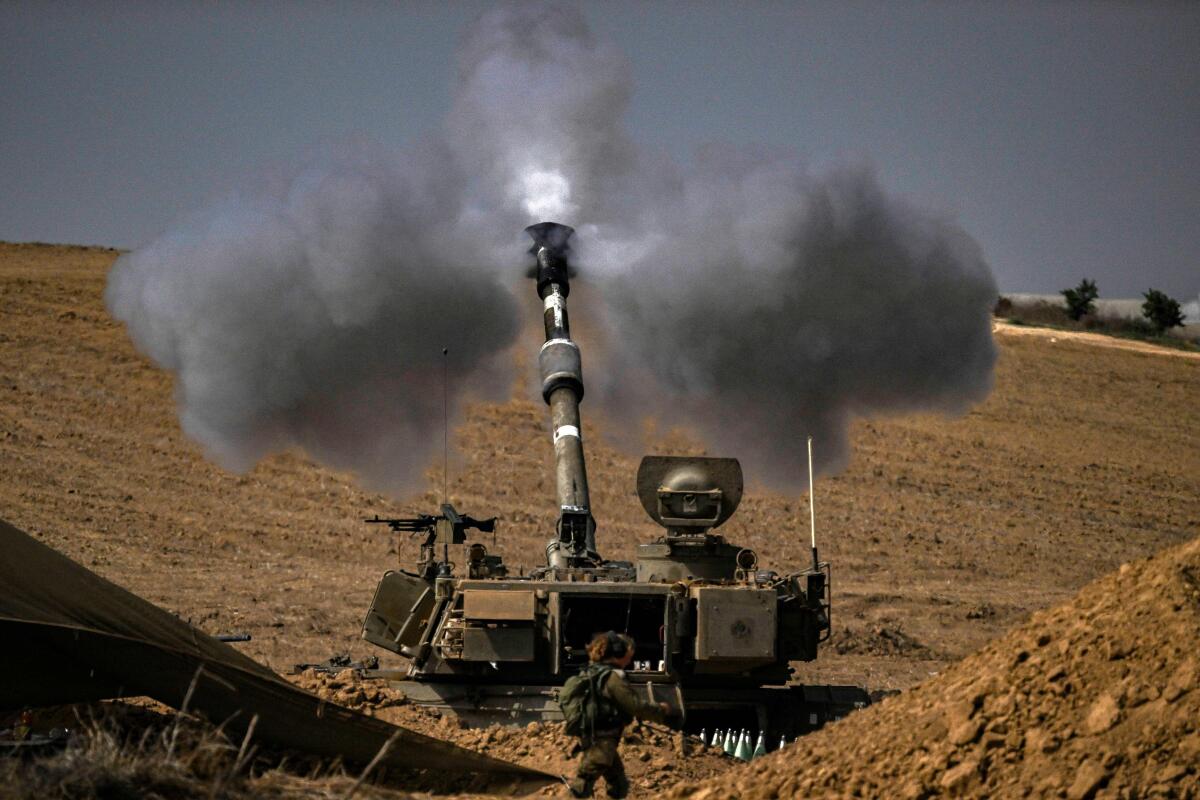
- Share via
JERUSALEM — Israeli Prime Minister Benjamin Netanyahu told the nation Saturday night that the military had opened a “second stage” in the war against Hamas by sending ground forces into the Gaza Strip and expanding attacks from the land, air and sea.
Casting the war as a fight for his country’s very survival, he warned that the assault would intensify ahead of a broad ground invasion into the territory.
“There are moments in which a nation faces two possibilities: to do or die,” Netanyahu said. “We now face that test, and I have no doubt how it will end: We will be the victors. We will do and we will be the victors.”
The bombardment, described by Gaza residents as the most intense of the war, knocked out most communications in Gaza, largely cutting off the besieged enclave’s 2.3 million people from the world, while enabling Israel to largely control the narrative in the new stage of fighting.
The military released grainy images Saturday showing tank columns moving slowly in open areas of Gaza, many apparently near the border, and said that warplanes had bombed dozens of Hamas tunnels and underground bunkers. The underground sites are a key target in Israel’s campaign to crush the territory’s ruling group after its attack on Israel three weeks ago.
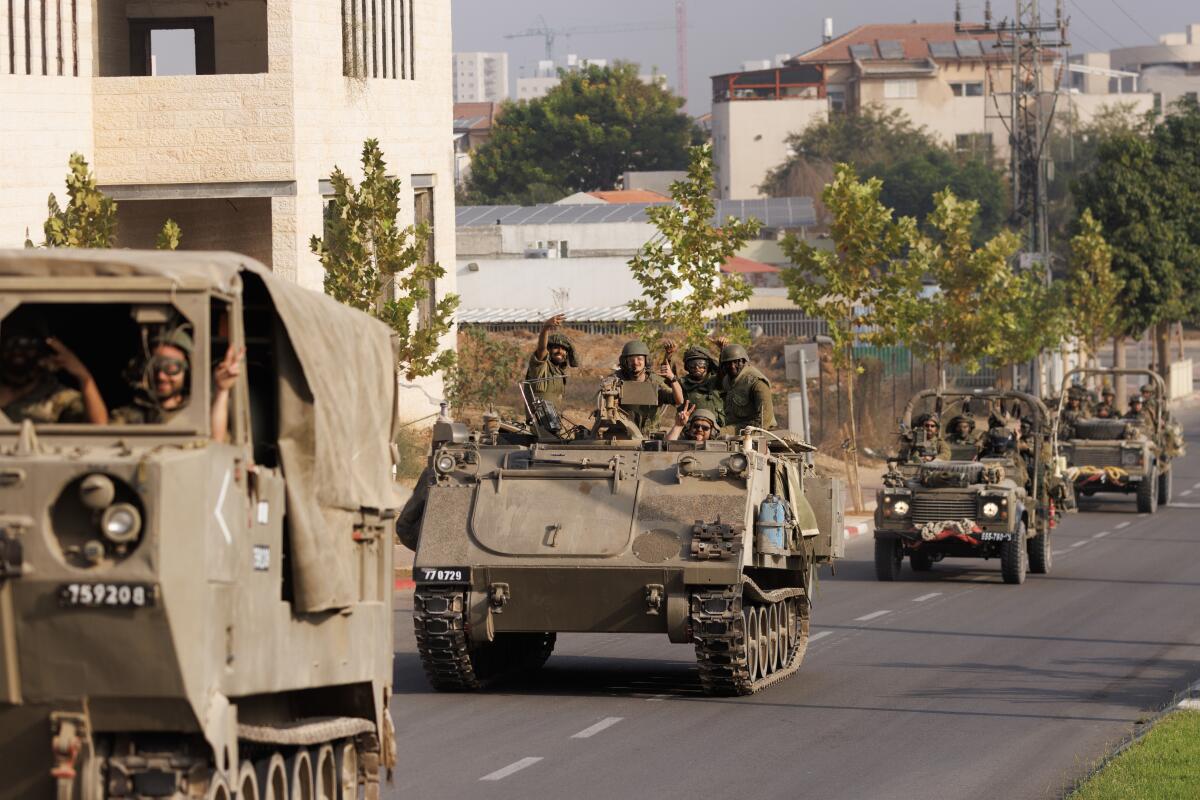
The escalation ratcheted up domestic pressure on Israel’s government to secure the release of roughly 200 hostages seized by Hamas on Oct. 7, when militants stormed from Gaza into nearby Israeli towns and gunned down civilians and soldiers. The unprecedented attack during a major Jewish holiday initiated a war between Israel and Hamas that could spread into a broader Mideast conflict.
Hostages’ desperate family members met with Netanyahu on Saturday and expressed support for an exchange for Palestinian prisoners held in Israel, a proposal floated by the top Hamas leader in Gaza.
Netanyahu said at the nationally televised news conference that Israel is determined to bring back all of the hostages, and maintained that the expanding ground operation “will help ... in this mission.” He said he couldn’t reveal everything being done to retrieve the hostages due to the sensitivity and secrecy of the efforts.
“This is the second stage of the war, whose objectives are clear: to destroy the military and governmental capabilities of Hamas and bring the hostages home,” he said, in his first time taking questions from journalists since the war began.
The prime minister didn’t address calls for a cease-fire, but in a speech peppered with references to centuries of Jewish history and military conflicts, made clear his view that Israel’s future depends on its success against “enemy” forces.
“Our heroic soldiers have one supreme goal: to destroy the murderous enemy and ensure our existence in our land. We have always said, ‘Never again,’” he said. “‘Never again’ is now.”
Netanyahu also acknowledged that the Oct. 7 “debacle,” in which more than 1,400 Israelis were killed, would need a thorough investigation, adding: “Everyone will have to answer questions, including me.”
The Israeli military said it was gradually expanding its ground operations inside Gaza, but stopped short of calling it an all-out invasion.
“We are proceeding with the stages of the war according to an organized plan,” said the chief military spokesman, Rear Adm. Daniel Hagari. The comments suggested a strategy of a staged escalation rather than a massive and overwhelming offensive.
Early in the war, Israel amassed hundreds of thousands of troops along the fence enclosing Gaza. Until now, troops had conducted brief nightly ground incursions and returned to Israel.
During the Israeli offensive, Palestinian militants have continued firing rockets into Israel, prompting constant warning sirens in southern Israel.
Violence surges in the West Bank as Israel increases raids to root out militants. Palestinians say the military is using the war as an excuse to crack down.
The Palestinian death toll in Gaza rose Saturday to just over 7,700 people since Oct. 7, with 377 deaths reported since late Friday, according to the territory’s Hamas-run Health Ministry. A majority of those killed have been women and minors, the ministry said.
Ministry spokesman Ashraf Qidra told reporters that the disruption of communications had “totally paralyzed” the health network. Residents had no way of calling ambulances, and emergency teams were chasing the sounds of artillery barrages and airstrikes to search for people in need.
An estimated 1,700 people remain trapped beneath the rubble left by the ongoing onslaught, according to the Health Ministry, which has said it bases its estimates on distress calls.
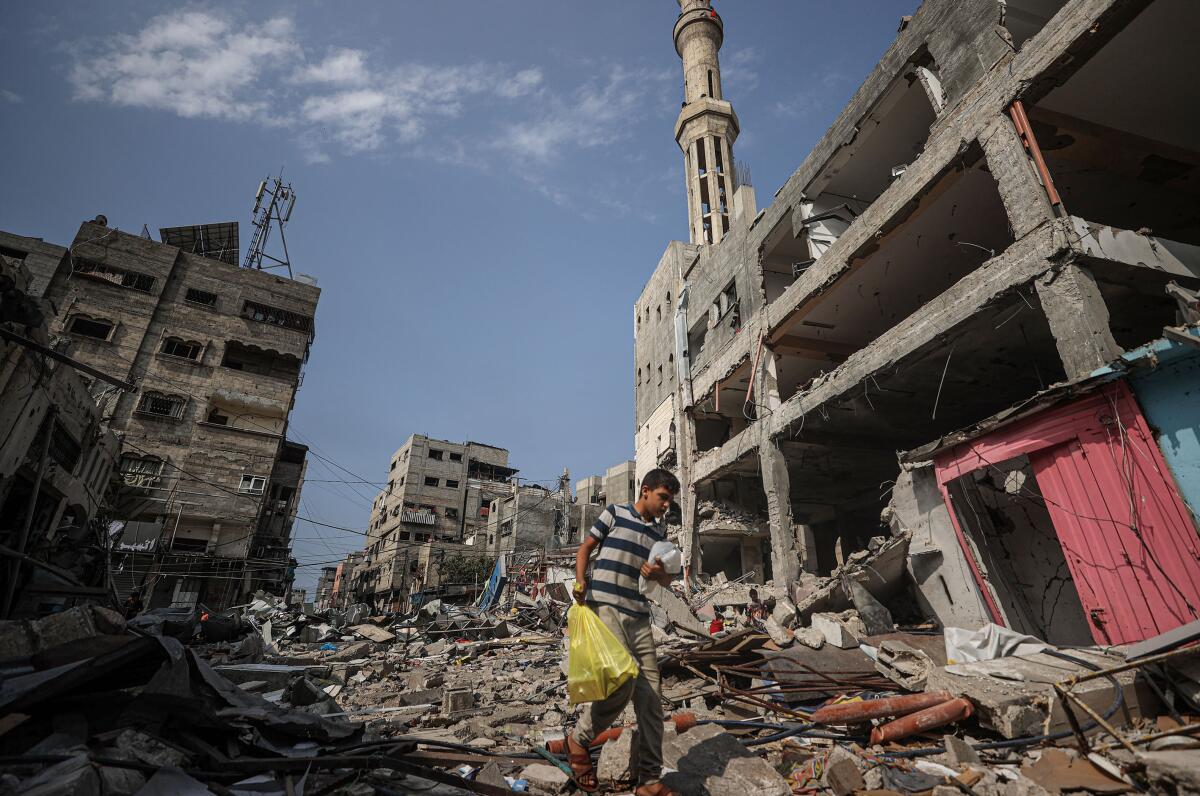
Civilians were using their bare hands to pull injured people from the rubble and loading them into personal cars or donkey carts to rush them to the hospital.
In a video posted by local news media, Palestinians are seen sprinting down a ravaged street carrying a wounded man covered in the dust of a building’s collapse, as he winces, eyes shut, on a stretcher. “Ambulance! Ambulance!” the men yell as they shove the stretcher into the back of a pickup truck and shout at the driver, “Go! Go!”
After a hospital blast in Gaza, doctors struggling to save lives amid danger and dwindling supplies say they and the medical system are near collapse.
Some Gaza residents traveled by foot or car to check on relatives and friends.
“The bombs were everywhere; the building was shaking,” said Hind Khudary, a journalist in central Gaza and one of a few people with cellphone service. “We can’t reach anyone or contact anyone. I do not know where my family is.”
Israel says that its strikes target Hamas fighters and infrastructure and that the militants operate among civilians, putting them in danger.
The World Health Organization appealed to “the humanity in all those who have the power to do so to end the fighting now” in Gaza.
“There are more wounded every hour. But ambulances cannot reach them in the communications blackout. Morgues are full. More than half of the dead are women and children,” the agency said in a statement, and it expressed “grave concerns” about reported bombardments near hospitals in the northern half of Gaza.
Israel and the Palestinian militant group Hamas appear set to go head-to-head on the ground in Gaza. What’s each side’s endgame?
Palestinians say this war is robbing them not only of their loved ones but also of the funeral rites that long have offered mourners some dignity and closure in the midst of unbearable grief. Overcrowded cemeteries have compelled families to dig up long-buried bodies and deepen the holes.
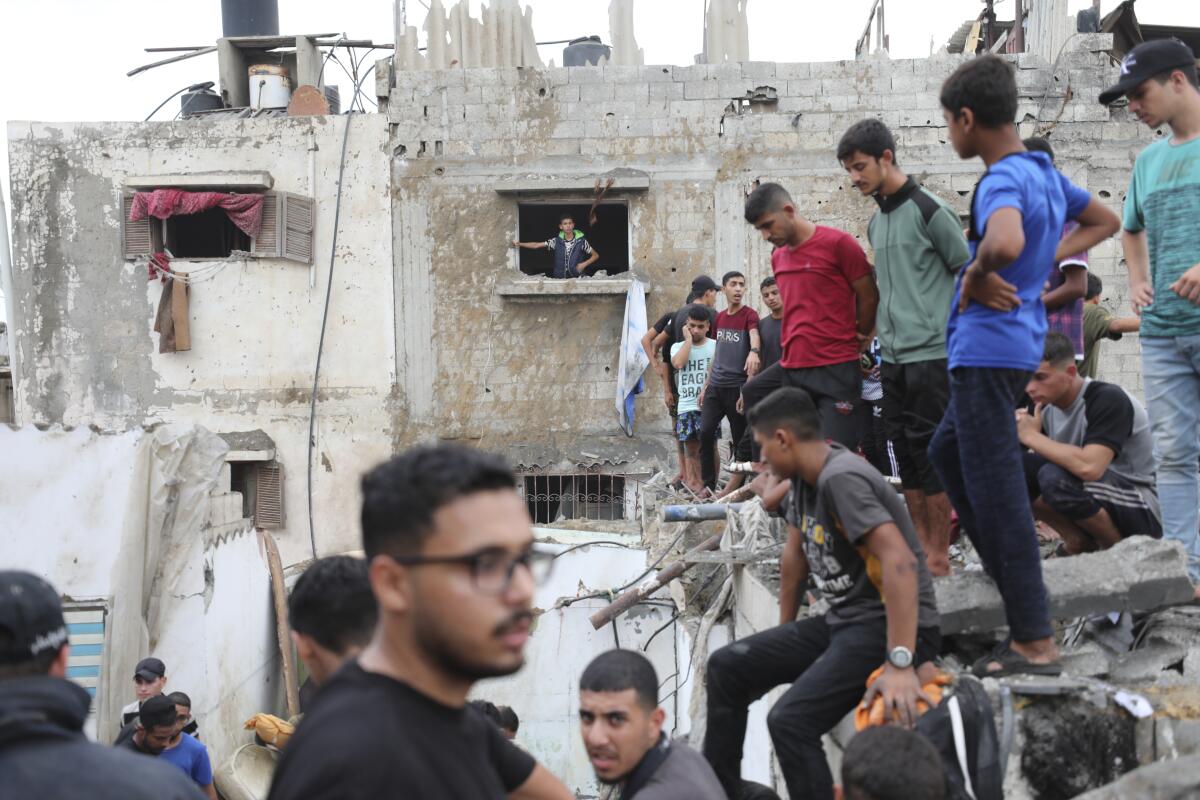
Throughout Gaza, terrified civilians were huddling in homes and shelters. More than 1.4 million people have fled their homes, nearly half of them crowding into U.N. schools and shelters, following repeated warnings by the Israeli military that they would be in grave danger if they remained in northern Gaza.
The military renewed such warnings Saturday, in leaflets dropped over Gaza. A large number of residents have not evacuated to the south, in part because Israel has also bombarded targets in so-called safe zones where conditions are increasingly dire. Food and water supplies were running out. Israel knocked out electricity early in the war.
Humanitarian workers say the trickle of aid Israel has allowed to enter from Egypt in the last week is a tiny fraction of what is needed. Gaza hospitals have been scrounging for fuel to run emergency generators that power incubators and other life-saving equipment.
The U.N. agency for Palestinian refugees, which runs an extensive network of shelters and schools for nearly half the displaced Gaza residents, has lost contact with most of its staff, spokeswoman Juliette Touma said Saturday. She said that coordinating aid efforts was now “extremely challenging.”
The intensified air and ground campaign raised new concerns about dozens of hostages taken to Gaza on Oct. 7. On Saturday, hundreds of relatives of hostages gathered in a square in downtown Tel Aviv, demanding that the government put the return of their loved ones ahead of Israel’s military objectives.
Hamas’ top leader in Gaza, Yahya Sinwar, said the Palestinian militant groups “are ready immediately” to release all hostages if Israel releases all Palestinians held in Israeli prisons.
Hagari, the Israeli military spokesman, dismissed the offer as “psychological terror.”
Israel-Hamas war: In a national vigil of sorts, Israelis hope for the return of more than 220 people seized by militants and believed held in Gaza.
Netanyahu’s office said in a statement that he had told relatives of the hostages, “We will exercise and exhaust every possibility to bring them home.” He did not specify a military or diplomatic plan.
Military officials have said they are trying to both topple Hamas and bring back the hostages, but have not explained how they could obtain both objectives at the same time.
Hagari said the confirmed number of hostages was 229, after four were released in recent days through mediation by Qatar and Egypt. He dismissed news reports about a possible cease-fire deal in exchange for the release of hostages, saying Hamas was engaged in a “cynical exploitation” of the anxieties of hostages’ relatives.
In Cairo, Egyptian President Abdel Fattah Sisi said his government was working to de-escalate the conflict through talks with the warring parties to release prisoners and hostages. On Saturday, he spoke with U.N. Secretary-General António Guterres about those efforts, his office said.
Israelis fault Prime Minister Benjamin Netanyahu for security failures that set the stage for war. Few see a path to leadership change amid the crisis.
Guterres said that he was “surprised by an unprecedented escalation of the bombardments and their devastating impacts,” and that “the situation must be reversed.”
Among many, impatience was growing. Turkish President Recep Tayyip Erdogan told hundreds of thousands of people at a pro-Palestinian rally in Istanbul on Saturday that his country was making preparations to proclaim Israel a “war criminal” for its actions in Gaza. He did not elaborate.
Israel’s foreign minister said he had ordered the return of Israel’s diplomatic mission from Turkey while ties with the country are reassessed.
Elsewhere, tens of thousands of pro-Palestinian protesters turned out in London for a second straight weekend to demand a cease-fire in Gaza.
More than 1,400 people were slain in Israel during Hamas’ Oct. 7 attack, mostly civilians, with ages ranging from infant to elderly, according to the Israeli government. Among those killed were at least 311 soldiers, according to the military.
The overall number of deaths in Gaza and Israel far exceeds the combined toll of all four previous Israel-Hamas wars, estimated at around 4,000.
On Israel’s border with Lebanon, residents are worried that groups like Hezbollah will join a war that eventually spirals into a regionwide conflict.
Israel has said it aims to crush Hamas’ rule in Gaza and its ability to threaten Israel. But how Hamas’ defeat will be measured and an invasion’s endgame remain unclear. Israel says it does not intend to rule the tiny territory but has not said who it expects will — even as Israel’s defense minister suggested a long-term insurgency could ensue.
The conflict has threatened to ignite a wider war across the region. Arab nations — including U.S. allies and countries that have reached peace deals or normalized ties with Israel — have raised increasing alarm over a ground invasion, expected to bring even higher casualties amid urban fighting.
Magdy reported from Cairo. Associated Press writers Samya Kullab in Baghdad and Josef Federman in Jerusalem contributed to this report.
More to Read
Sign up for Essential California
The most important California stories and recommendations in your inbox every morning.
You may occasionally receive promotional content from the Los Angeles Times.
